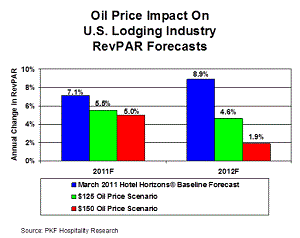
UNITED STATES If oil prices surge to US$150 per barrel, the recovery that U.S. hotels are currently enjoying could be severely curtailed, based on an analysis conducted by PKF Hospitality Research.
The firm’s econometric forecasting model relies on economic data from Moody’s Analytics to project future hotel demand levels. In April, Moody’s created two “oil spike” economic forecasts around a hypothetical future where prices increase to either a high of US$125 or US$150 per barrel by the fourth quarter. PKF-HR used these hypothetical economic scenarios to forecast RevPAR for the U.S. lodging industry through 2013.
“As the price of oil has shot up and then down over the past few months, many U.S. hoteliers have worried about the impact that oil prices could have on their business,” says Mark Woodworth, president of PKF-HR. “Our analysis found that when oil prices increase beyond normal levels, individual consumer and business spending power is reduced, which in turn has a negative multiplier effect throughout the economy in general and the lodging industry specifically. Based on our study, oil prices above US$125 a barrel exceed ‘normal’ levels and would have an increasingly negative effect on hotel operating performance.”
According to Moody’s, the U.S. economy could weather a rise in oil prices to US$125 per barrel, but a surge to US$150 would trigger a mild recession. In the US$150 per barrel scenario, Moody’s forecast of real GDP growth falls by a maximum of 2.6 percentage points to an annualized low of 1.5% in 2012.
When applying the two alternative economic forecast scenarios to the PKF-HR lodging forecasting model, the dampening effect of high oil prices on RevPAR growth becomes clear. RevPAR gains observed in the beginning of 2011 will not continue if oil prices move as scripted in both of Moody’s oil spike scenarios.
U.S. hotel RevPAR is projected to increase a combined 16.3% over the course of 2011 and 2012, as of PKF-HR’s latest forecast in March. When the economics of the two alternative scenarios are applied to PKF-HR’s forecast model, it shows modest changes in RevPAR growth in 2011, but fairly significant differences in 2012. Over the two-year period of 2011 and 2012, RevPAR would increase just 10.1% if oil prices reach US$125. However, if oil prices were to surge to US$150 a barrel, RevPAR growth would be limited to a very modest 6.9%.
Looking specifically at location segments, PKF-HR then tested which ones are more susceptible to an increase in oil prices. Not surprisingly hotels reliant on “drive-to” business will see the first impacts of increased oil prices; this includes interstate, suburban hotels and resort locations near major metropolitan areas. Secondary declines will be seen in “fly-to” resort locations once other hedging strategies—taking the train, reducing other vacation expenditures— are exhausted.
“Moody’s highlights the low probability of these oil spike scenarios,” says Jack Corgel, a real estate professor at Cornell University’s School of Hotel Administration and a senior advisor to PKF-HR. “We believe that oil prices could have a profound impact on future revenue, should those prices either get ahead of the economy from speculation, or if political unrest accelerates. For these reasons, the price of oil should be on everyone’s radar when planning for the future.”
The results of the analysis have been published in a special report entitled “Oil Prices and Lodging Risk,” which is available for free download. The report is authored by Corgel and PKF-HR research associate Jamie Lane.
